In This Mountain Read online
Page 28
Homemade
Dipping Sauce.
Someone had tried to illustrate the broadside with pencil sketches of gizzards. Not a good idea.
“What we’re findin,’” said Percy, “is Velma’s dippin’ sauce is great with a whole bunch of menu items.”
“Burgers!” said Velma.
“Fries!” said Percy.
“You name it,” Velma concluded. “Even turnip greens.”
“Aha!”
“Th’ fire chief puts it on ’is eggs, you ought to order your eggs scrambled this mornin’, goes great on scrambled eggs.”
“It’s a little too early for dippin’ sauce,” said Father Tim, feeling queasy.
Velma gave him the once-over. “Variety is th’ spice of life.”
“Right,” he said. “But not before eight o’clock.”
Dooley was tight-lipped, as he idled his spoon in a bowl of Cheerios. Father Tim felt quiet himself—who knew what the day would bring?
Dooley looked up suddenly. “How come Doc Harper bought her a BMW?”
“It’s in mint condition, he got it for a great price, and it’s said to be one of the safest cars out there.”
“It was a stupid move.”
“A stupid move?”
“Nobody in college needs a hot car like that, it makes her look like a snob, a real show-off.”
“I don’t believe Lace is a show-off.”
Dooley didn’t respond. The look Father Tim saw on his face was familiar; he’d seen it when he and the boy first met. Dooley was seething inside.
“Talk to me,” said Father Tim. “What’s going on?”
“My Jeep looks like crap. I don’t have the money to get the rust spots fixed or have it painted. I hate driving it.”
“You never mentioned that ’til Lace got the…coupe.” He wanted to avoid using the name BMW entirely; it seemed to have some spell-binding power that coupe or car lacked.
I have put one and a quarter million dollars where it will grow, and have made provisions to complete his preparatory education.
When he is eighteen, the income from the trust will help send him through college.
I am depending on you never to mention this to him until he is old enough to bear it with dignity.
Dooley’s voice was cold. “I don’t want to talk about it.”
“Then let’s don’t,” said Father Tim.
The air had cooled; along the riverbanks it was fresh and sweet, with none of the broiling humidity of August.
Buck steered the red pickup down a road that Father Tim now found familiar, and made the turn by the wayside pulpit.
Fear knocked, faith answered.
No one was there.
Buck pulled at his chin with his left hand, deep in thought. Dooley was as frozen as park statuary; Father Tim knew that, in his father, the boy would face a thousand demons.
As for himself, he tried sitting loose. He had prayed the prayer that never failed and was trusting the One to whom he’d prayed it.
There was nothing more he could do. Nothing.
Frail and shirtless, Clyde Barlowe squinted through the torn screen door.
“They ain’t no Sammy livin’ here.”
“I’m Tim Kavanagh from Mitford.” The dog sniffed his pant leg.
“Buck Leeper,” said Buck.
“And this,” said Father Tim, “is Dooley. Dooley Barlowe.”
The barefoot, unshaven man peered closely at Dooley, then uttered an oath.
“When’s Sammy due back?” Buck demanded.
Clyde Barlowe’s left eye gazed at them, blank. “I don’t keep up with nobody named Sammy. Y’all better split before I git my dogs on you, I keep some bad dogs out back.”
Father Tim recoiled at the flume of breath that issued like a sour vapor through the screen.
“Look here, Barlowe…” Buck stepped closer to the door.
“M’ name ain’t Barlowe, it’s Jaybird Johnson. Ever’body calls me Jaybird, that’s th’ name on m’ my gov’ment checks. Cain’t nobody prove I ain’t Jaybird. Now git offa my place, an’ stay off.” Clyde Barlowe stepped back, grabbed the door, and slammed it hard.
Dooley jumped from the top step and ducked around the corner of the trailer by a propane tank. He returned moments later, shamefaced, wiping his mouth with the back of his hand.
“Puked,” he mumbled.
They waited a half hour near the entrance to the shade garden, speaking very little. Perhaps he would come…
For a time, the dog stood at a distance, then ambled over and lay at Dooley’s feet, its tail beating the dust.
“Let’s wait a few more minutes,” said Dooley.
They were walking toward the bridge more than an hour later when Dooley stopped and looked back at the trailer.
“He’s not…” There was a long pause.
“He’s not what?” Father Tim asked.
“He’s not tall anymore.”
Hope Winchester knew what people were saying about George Gaynor.
Not that it was anything incredibly serious, but she despised the snide remarks made here and there, and the skeptical glances.
It seemed very clear—as long as he’d been the Man in the Attic, he’d been glamorous, mysterious, exotic. He’d descended the church stairs looking like a rock star with his long, flowing hair, then made his dramatic confession in front of the entire congregation, afterward asking Father Tim to call the police to take him away. Not a few witnesses of this breathtaking event thought it a thrilling scenario for a movie; several found it a shame that Harrison Ford was too old for the part.
She remembered vividly the day the FBI arrived in Mitford in their black cars with dark windows that no one could see through—nearly everybody in town had stood on Main Street to wave goodbye to a confessed criminal who’d endeared himself to their hearts for all eternity.
But of course it hadn’t been for all eternity.
Now the Man in the Attic was real and actual, a flesh-and-blood human being working in their bookstore and living with another convict just down the street. At least two customers had insinuated that for all they knew, George Gaynor and Harley Welch spent their nights plotting shadowy deeds while innocent people lay sleeping. They thought it unwise of Father Tim, who did so many things right, to get this one thing so very wrong. The least he could do, someone suggested, was separate the two. The owner of Chelsea Tea Shop, who considered Harley a good sort, said that being in prison for running liquor wasn’t all that bad, really, but consider what a criminal did in prison—he learned bad things from other criminals, so that what he knew going in was horribly multiplied when he came out, did anyone get the point?
Helen, the bookstore owner, hadn’t said a word about their new employee, but then, she lived in Florida for nine months of the year and all she looked at was the bottom line. In truth, the first several weeks of George Gaynor’s employment had been quite evident in the bottom line—people had swarmed in to see him, people like Emma Newland, who had never read a book in her life, as far as Hope could determine, and Esther Bolick, who had purchased a copy of Bathroom Trivia, Volume I for her husband who, Esther didn’t mind confiding, was constipated due to his current medication for a brain tumor.
Scott Murphy, the chaplain at Hope House, had come in at least twice. Once he’d stepped into the mailroom with George and she thought she heard Scott call him “brother” and heard them praying together, which didn’t please her at all; maybe Scott knew this, because on the way out, he bought a copy of The Clean Joke Book in paperback. “For the residents at Hope House,” he said, smiling. She’d heard that Scott Murphy had those elderly people dancing, writing their life stories, and working in the garden. She knew he had two Jack Russells which he used somehow in his work.
Hope had been frankly relieved when the common horde had gotten their fill of George Gaynor and made room for people who actually loved and read books, which, in the scheme of things, seemed a dwindling and precious few.
>
In any case, the owner had for years trusted Hope Winchester to get it right, and so far, Hope believed, she had gotten it right.
And now this.
She was wringing her hands in the mailroom when George came in with a large box for UPS. He set it down and looked at her, smiling. She realized she was wringing her hands, but couldn’t seem to stop, she could not will herself to stop. It was hugely embarrassing to be caught in so many awkward circumstances—talking too much, laughing too loudly, dropping books, calling Henry James ‘James Henry’; she had even stopped using big words unnecessarily.
“You’re concerned about something,” he said.
She hated the direct way he stated things, stripping away convention and getting to the very marrow of meaning. If only she had courage, she would fire him at once, just to be rid of the volatile feelings she suffered in his presence.
But she’d never fired anyone; and, until George Gaynor, she’d never hired anyone, either. All she had ever wished to do was sit on the stool and order books, read, and satisfy customers like Father Tim, who often wanted the unique, the hard-to-find, the out-of-print. She had never wished to be management.
“Yes!” she said. “I mean, no. No! Not at all.”
“Are you concerned about what people are saying?”
“What…exactly…are they saying?”
“Some feel uncomfortable because Harley and I—”
“Oh, that!” she said, her voice hoarse. Then, without warning, she burst into tears. The tears seemed to explode from her, as one might suddenly be seized by a violent cough, and she realized she was sobbing.
She had every intention of running into the bathroom and locking the door, but instead thumped down on the box of books he’d just carried in, and put her head in her hands, and wept without caring what he thought.
They were making the turn by the wayside pulpit when they noticed the faded green pickup truck moving toward them.
Though his vision wasn’t the best, Father Tim saw the hair through the windshield and knew at once.
“Dooley,” he said with a lump in his throat, “it’s your brother.”
“Ho!” yelled Buck, throwing up his hand at the driver.
Lon Burtie made the turn and braked his vehicle as he pulled alongside. He peered cautiously at the occupants of the red truck.
“How’re y’all?”
“Good,” said Buck. “Sammy, we’ve brought your brother, Dooley, to see you.”
Father Tim opened the passenger door and got out. Dooley sat for a moment as if paralyzed, the color drained from his face. Then he moved over and got out, also, and walked around to the front of the truck as if in a dream.
Sammy jumped down from the green truck and stood by the door, waiting, his eyes wide and frightened.
No one spoke. Lon Burtie cut off the ignition and sat with his right wrist on the steering wheel. Buck turned off his ignition.
Dooley stood for a long moment, leaning against the hood. Then he drew himself up and walked to the front of the green truck.
“Hey,” whispered Dooley, looking at his brother.
Sammy nodded, but could not speak.
CHAPTER SEVENTEEN
A Coal Yet Burning
He’d expected to pay a price for yesterday’s journey. Yet it hadn’t exhausted him in the least.
After bounding with Barnabas to the monument, he legged homeward with schoolboy eagerness, changed into something comfortable, brewed a cup of tea, and sat down to his long-neglected essay.
He found it as mute as marble.
What had he meant by all that scribbling, anyway? Another man might have penned it; he’d never known something from his own hand to be so alien in meaning and purpose.
He dumped the pages into the wastebasket, removed the legal tablet from his desk drawer, and took up the pen his wife had given him. Then, filled with conviction, he went at it—head down, as into the wind.
Surviving…the…Blade, he wrote.
Had he turned a corner, somehow, and survived the blade of these last ghastly months? Was it over? Had God brought him out into the light, or was there darkness yet to come?
But he mustn’t try to second-guess God. He had no idea at all what was yet to come—no one ever knew, of course. St. Francis de Sales had spoken ably to that: “Do not look forward to what may happen tomorrow; the same everlasting Father who cares for you today will take care of you tomorrow and every day. Either He will shield you from suffering, or He will give you unfailing strength to bear it.”
He bent over the tablet, writing furiously, his tea going cold in the cup….
A cramp in his right hand brought him awake to the sight of the maple tree in the park; to the sound of his dog snoring; to the realization that Violet was wrapping herself around his leg, leaving a pelt of white fur in her wake.
Thanks be to God.
He was alive, he was writing, he was working! He had vanished into another realm for…how long?
He checked his watch. Two hours. Two hours in which his feeble frame had sat without aching or remorse, two hours in which he’d taken a kind of winged flight and unburdened his heart, able to say what he had to say without looking back. It was the mountaintop after a long trek through a parched valley.
He got up and went to the back stoop and inhaled the afternoon air, seeing the hedge in some crisp, clear way he hadn’t seen it in a very long time. He put his head back and closed his eyes, giving thanks. For two blessed hours, he had been a river without a dam, a colt without a fence.
He would relish the moment, and not expect the worst to befall him for relishing it.
“‘And now in age I bud again!’” he recited aloud from George Herbert. “‘After so many deaths I live and write, I once more smell the dew and rain,/And relish versing: O my only Light,/It cannot be That I am he /On whom Thy tempests fell all night!’”
Suddenly self-conscious, he turned and hurried inside to the phone, where he kept the list of places he might reach Cynthia.
He wanted her to know that he’d written the first draft of an essay he actually liked, that he had found in himself a coal yet burning. Even if his new freedom couldn’t be counted on to last, he wanted to savor this pinprick of joy and share it.
Hélène Pringle was placing an African violet on the radiator shelf by the dining room window when she looked up and saw her neighbor.
Father Kavanagh was standing on his back stoop in what appeared to be drawstring pajamas, speaking aloud and lifting his hands in what could be described as a priestly gesture. She saw on his face an odd look—something like bliss, she thought.
A shiver of happiness seized her, as if she’d just witnessed a kind of omen she’d been looking for without realizing it.
He sat in the wing chair in their bedroom, missing his wife—her countenance, her whiffling snore on the neighboring pillow, her softness of spirit, her unaffected eagerness, her warm flesh.
He missed the way she took over when he needed her to take over and the way she stepped back when he needed to make decisions, or even mistakes, on his own. He’d done the right thing by insisting she go; he despised the mewling infant he’d been for weeks on end, and was learning he could do without her if push came to shove.
He stood up and stretched and placed his glasses on the night table. In a sense, her going away had allowed him to really come home.
He patted the foot of the bed; Barnabas leaped to his place at once. Then he knelt and prayed for his wife, traveling to places he would never see, flying in planes he would never board—in her was a vast store of courage and adventuring that he would never possess.
He crawled into bed, thinking that one day he would make up to her the long weeks she’d pampered and protected him. He would do something wonderful for her, something that required a true sacrifice on his part, not just any old thing that was easily tossed off.
Perhaps he would take her somewhere…somewhere she had always wanted to go.
; The idea that suddenly occurred to him was electric, bringing him fully awake and sentient. He would take her to his ancestral homeland, that great, green, mysterious land out of whose loins his paternal line had found its way to America—to Pennsylvania and Kentucky and Mississippi and Mitford.
The excitement he felt over this idea was startling. It surpassed even the joy he felt about the meeting at Lon Burtie’s house two days hence, the meeting in which Dooley, Jessie, and Poo would visit their brother, as God continued to restore to the Barlowes the days the locusts had eaten.
He took notes as John Brewster gave him the scoop.
…r. on Tamblin Rd at serv station 1 mi and r. on Springlake Dr—park in lot next to lake, Mary Fisher wl drive me to private chapel, Rite I arrive 5 p.m. MF @ 972/604-7832
The roads to Kinloch were winding—it would be more than an hour and a half each direction.
He rang Mary Fisher twice but got an answering machine with a digital voice recording that declined to take a message.
He gazed into the mirror of his old walnut dresser, turning his head this way and that. He definitely needed a little shearing for the events of Sunday.
He hoofed to Joe Ivey’s minuscule shop at the rear of Sweet Stuff. Closed, read the sign.
He went around to Main Street and opened the door to the bakery—one of his favorite things to do. In truth, just opening the door was enough for him; he’d learned to relish the aroma without craving an entire tray of glazed donuts.
He rang the bell on the bake case. “Winnie! Are you there?”
“Yessir,” she said, coming through the curtains, wiping her hands on a paper towel. “But I just got here a minute ago, I’ve been at th’ hospital, I guess you heard about Joe.” She looked red-eyed and worn.
“No! What?”
“He’s got this.” She pulled a scrap of paper from her apron pocket and handed it to him.
“Hemochromatosis,” he read aloud.
“It’s inherited. It’s too much iron collectin’ in th’ blood, an’ it’s caused…it’s caused…Look on th’ back of that paper.”

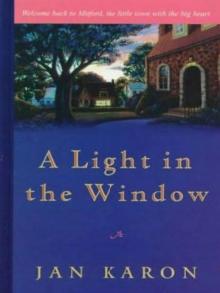 A Light in the Window
A Light in the Window Somewhere Safe With Somebody Good
Somewhere Safe With Somebody Good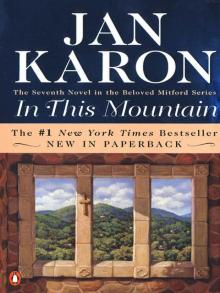 In This Mountain
In This Mountain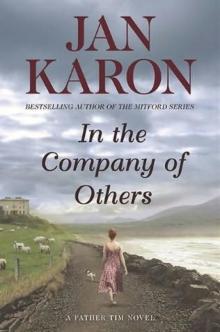 In the Company of Others
In the Company of Others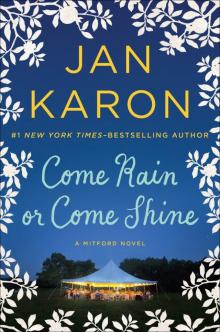 Come Rain or Come Shine
Come Rain or Come Shine To Be Where You Are
To Be Where You Are These High, Green Hills
These High, Green Hills Light From Heaven
Light From Heaven A New Song
A New Song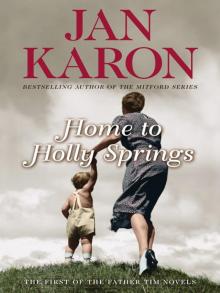 Home to Holly Springs
Home to Holly Springs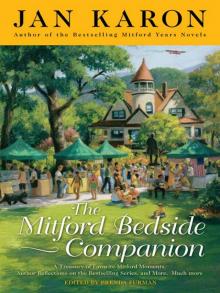 The Mitford Bedside Companion
The Mitford Bedside Companion At Home in Mitford
At Home in Mitford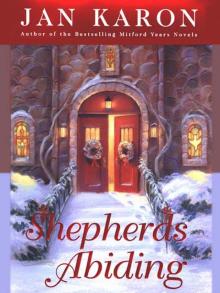 Shepherds Abiding
Shepherds Abiding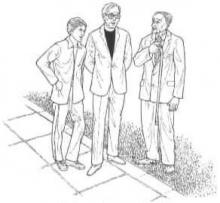 Out to Canaan
Out to Canaan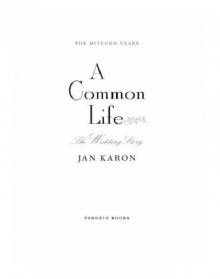 A Common Life: The Wedding Story
A Common Life: The Wedding Story Jan Karon's Mitford Years
Jan Karon's Mitford Years